The Apology of Aristides
Links Romans 1
to Shrine Prostitution
Was Aristides citing Romans 1?
 |
Aristides
was an Athenian Christian philosopher who died in AD 134.
This born again, saved, Spirit-filled native Greek speaker who was born about 10 years after the apostle Paul died certainly had more insight into the meaning of Romans 1 than do we in the 21st century. His oration before the Roman Emperor Hadrian in AD 125 is famous because he defended Christianity as superior to pagan religion while attacking Greek idolatry.
Although Hadrian was married to Empress Sabina, the love of his life was his handsome male lover, Antinous, who died in AD 130. The historical record gives no indication that Arist. mentioned homosexuality in general or linked Romans 1 to pederasty or homosexuality in general. His focus is on exalting Christianity and condemning pagan Greek idolatry.
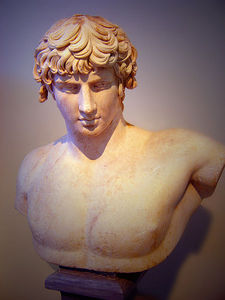 |
Bust of Antinous,
lover of Hadrian
Some have questioned my assertion that this Athenian Christian philosopher, in AD 125, understood the apostle Paul, in Romans 1 to be decrying shrine prostitution and Cybele worship in first century Rome.
The Apology of Aristides, from which we quote, can be found at New Advent Fathers. We use their section numbering and paragraphs below, to make it easy to find the quotes.
The Apology of Aristides
Aristides section 2 - "The Barbarians, indeed, trace the origin of their kind of religion from Kronos and from Rhea and their other gods"Arist. speaks of the false religion of Kronos (the North African name for Molech, Lev 18:21, 20:2, 3, 4 , 5).
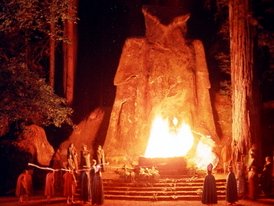 |
Moloch worshipers at a pagan shrine.
Aristides speaks of the false religion of Rhea (which is another name for the fertility goddess Cybele, known as the Protectress of Rome. The Phyrgians and Romans called her Cybele; the Cretans called her Rhea, according to Gordon Rattray Taylor's, Sex in History, Book 3, Chapter 12 - See the tenth paragraph on that page.
In section 3, Arist. refers to Paul's argument in Romans 1. Aristides free quotes verses in Romans 1 in his argument to the Roman Emperor Hadrian.
Section 3 - "The Barbarians, then, as they did not apprehend God, went astray among the elements, and began to worship things created instead of their Creator; and for this end they made images and shut them up in shrines..."
Compare Arist. "began to worship things created instead of their Creator" to Romans 1:25 - "worshipped and served the creature more than the Creator..."
Compare Arist. "they made images and shut them up in shrines" to Romans 1:23 - "changed the glory of the uncorruptible God into an image made like to corruptible man, and to birds, and to four-footed beasts, and creeping things..."
Section 4 - Aristides refers to Romans 1 when he says: "Let us turn now, O King, to the elements in themselves, that we may make clear in regard to them, that they are not gods, but a created thing..."
Compare this to Romans 1:25 - "worshiped and served the creature more than the Creator..."
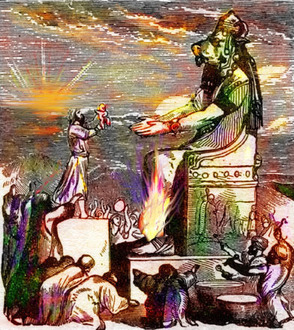 |
Moloch Idol
More from Aristides
Section 4, paragraph 2 - Aristides cites the earth because he is dealing with Rhea/Cybele, the fertility goddess whose worshipers engaged in male-male anal sex and male-female anal sex in their attempt to get the fertility goddess to have sex with her consort and thereby cause the earth to be fertile instead of unfruitful.
Section 6, paragraph 1 - Aristides speaks of the sun god. Molech, whom Aristides has already mentioned (Kronos/Molech) was the Canaanite sun god.
Section 7, paragraph 2 - "O King, we are bound to recognize the error of the Barbarians, that thereby, since they did not find traces of the true God, they fell aside from the truth, and went after the desire of their imagination, serving the perishable elements and lifeless images, and through their error not apprehending what the true God is."
Arist. "they fell aside from the truth" Compare this to Romans 1:18 - "who hold the truth in unrighteousness"
Arist. "went after the desire of their imagination" Compare this to Romans 1:21 - "became vain in their imaginations"
Arist. "not apprehending what the true God is" Compare this to Romans 1:21 - "their foolish heart was darkened"
Section 8 - "The Greeks, then, because they are more subtle than the Barbarians, have gone further astray than the Barbarians; inasmuch as they have introduced many fictitious gods, and have set up some of them as males and some as females...
For if they who are called their gods practised all these things which are written above, how much more should men practise them— men, who believe that their gods themselves practised them...
It was by reason of this alone that they suffered and that all these things came upon them; and while they endured those things they did not perceive in their mind that for their error those things came upon them."
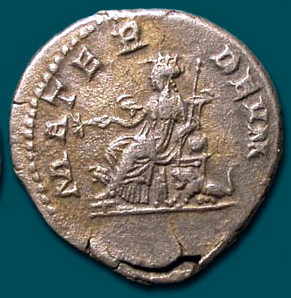 |
Cybele, on a Roman coin
as Mater Deum,
mother of the gods
Arist. hearkens back to his earlier statement about Kronos/Molech and Rhea/Cybele and points out about the Greek gods, that
"some polluted themselves by lying with males." Compare this to Romans 1:27 - "And likewise also the men, leaving the natural use of the woman, burned in their lust one toward another; men with men working that which is unseemly, and receiving in themselves that recompense of their error which was meet."
There are clear contextual echoes from Romans 1 in Aristides' oration about false gods and their false sexual worship.
Section 9, paragraph 1 - "Let us proceed further to their account of their gods that we may carefully demonstrate all that is said above. First of all, the Greeks bring forward as a god Kronos (called Molech in other cultures), that is to say Chiun (Saturn). And his worshippers sacrifice their children to him, and they burn some of them alive in his honour. And they say that he took to him among his wives Rhea..."
Remember that God warned ancient Israel against sacrificing their children to false gods like Molech in Leviticus 18:22 and 20:13. Remember also that the apostle Paul, who wrote Romans 1, heard Stephen preach against Moloch in Acts 7:43, before his dramatic conversion on the road to Damascus. Context emphasizes and re-emphasizes that Paul is referencing Israel's history of apostasy, of following Gentile gods.
Aristides returns to his theme of false worship of false gods, mentioning Kronos/Molech and Rhea/Cybele (section 11, paragraph 5) and Aphrodite, the Greek equivalent of Cybele (section 11, paragraph 3).
Section 9, paragraph 3 - "By reason of these tales, O King, much evil has arisen among men, who to this day are imitators of their gods, and practise adultery and defile themselves with their mothers and their sisters, and by lying with males, and some make bold to slay even their parents. For if he who is said to be the chief and king of their gods do these things how much more should his worshippers imitate him? And great is the folly which the Greeks have brought forward in their narrative concerning him. For it is impossible that a god should practise adultery or fornication or come near to lie with males, or kill his parents; and if it be otherwise, he is much worse than a destructive demon."
Section 16, paragraph 2 - "Take, then, their writings, and read therein, and lo! You will find that I have not put forth these things on my own authority, nor spoken thus as their advocate; but since I read in their writings I was fully assured of these things as also of things which are to come."
Aristides drew his thoughts about false gods and true religion from the Christian scriptures. In the context of decrying the false religion of the Barbarians and the Greeks, he points out their false religious ritual of same sex activity which pagans practiced in imitation of the activity of their false gods, males "lying with males."
The reference is not a general reference unrelated to idolatry. Aristides relates same sex activity to idolatry because he is referring to Paul's words in Romans 1.
"Men lying with men" is only mentioned in the New Testament in Romans 1:27. Aristides can only be referring to Romans 1:27 when he makes these remarks.
Paul did NOT attack
gays and lesbians in Romans 1
This indicates that very early in church history, within 70 years of the writing of Romans, native Greek speaking Christians understood the apostle Paul to be referencing shrine prostitution by women, Romans 1:26 and men, Romans 1:27, as examples to support his argument against idolatry. To make Paul's words in Roman 1:26-27 a negative blast at homosexuality in general is to entirely miss the point of Paul's argument.
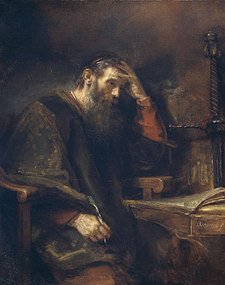 |
Paul, God's
incredible apostle
Making the GLBT community your scapegoat and the object of condemnation in Romans 1:26-27 can only be done when you deny the evidence of church history, which places Romans 1 in the context of idolatry and worship of false gods. Because things different are not equal, two men or two women falling in love and spending their lives in committed relationship is most definitely not what Paul referenced in this important passage.
A legal, loving same sex marriage is in no way analogous to pagan shrine prostitutes using sex to worship the fertility goddess.
Related Links for Romans 1:26-27
1. Are Romans and shrine prostitution
historically linked?
2. What does against nature
mean in Romans?
3. What is an abomination
in the Bible?
4. Is it true that I will go to hell
because I am a lesbian?
5. Are Christians required
to keep Torah Law?
7. Does Gay Analogy support
same sex partnerships?
8. Is it dishonorable to compare
gay relationships to beastiality?
9. What is justification by faith?
From Aristides, return to
Gay Christian 101 Home Page.
Google Translate
into 90 languages
We are saved:
by grace alone through faith alone
Recent Articles
-
Gay Christian 101 - Affirming God's glorious good news for all LGBs.
Jan 08, 24 12:57 AM
Gay Lesbian Bisexual Christian 101 - Accurate biblical and historical info defending LGB Christians from the anti-gay crowd. -
Romans 1 describes ancient shrine prostitution, not gays and lesbians.
Dec 21, 23 04:37 PM
Romans 1, in historical context, is about ancient Roman fertility goddess worshipers who engaged in shrine prostitution to worship Cybele, not gays and lesbians. -
The Centurion And Pais - When Jesus Blessed A Gay Couple.
Nov 14, 23 10:32 PM
Centurion and Pais? If Jesus blessed a gay relationship, would this change your view of homosexuality?
Bible Study Resources
for eDisciples



